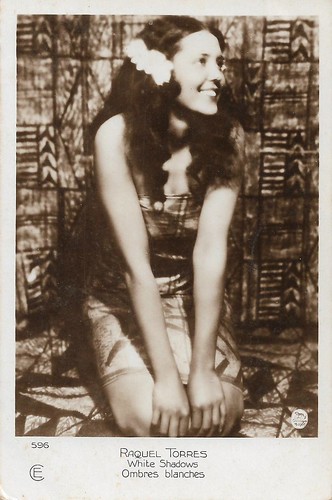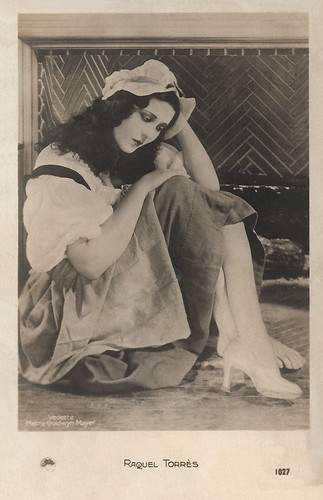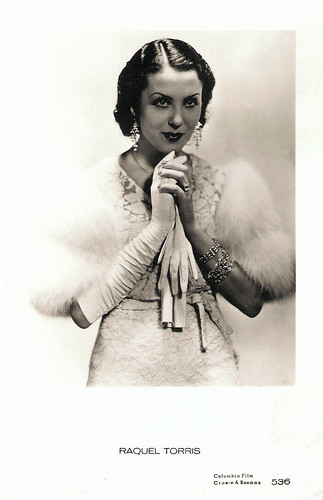Raquel Torres (1907-1987) was a Mexican-born American film actress. She had her breakthrough as a Polynesian beauty in White Shadows in the South Seas (1928). She played island girls, biracial beauties and was a sexy foil to the Marx Brothers in Duck Soup (1933). After marrying a stockbroker in 1935, she retired.

Belgian postcard by P.I.A. Belga Phot., Bruxelles. Photo: Metro-Goldwyn-Mayer.

French postcard by Cinémagazine-Editions, no. 596. Photo: Metro-Goldwyn-Mayer. Raquel Torres in White Shadows in the South Seas (W.S. Van Dyke, Robert Flaherty, 1928).

German postcard by Ross Verlag, no. 5625/1, 1930-1931. Photo: Metro-Goldwyn-Mayer. Raquel Torres in Aloha (Albert S. Rogell, 1931).
Raquel Torres was born Maria Guillerma Osterman in 1907 in Hermosillo to a German immigrant father and a Mexican mother. Her sister was actress Renee Torres. Her mother died while Raquel was very young and the family moved to the United States, where she spent most of her time.
Her name change, including the adoption of her mother's maiden surname, as well as speaking with a fake accent, was done to capitalise on, and conform to, early Hollywood's idea of 'Latin-ness'.
The 19-years-old Torres played a Polynesian beauty opposite Monte Blue in White Shadows in the South Seas (W.S. Van Dyke, 1928), a silent film shot in Tahiti. It was MGM's first film to synchronise music, dialogue, and sound effects. She gained the role after 300 applicants were rejected. The beautifully shot film went on to win the Best Cinematography Oscar.
The next year she was third-billed behind Lily Damita and Ernest Torrence in The Bridge of San Luis Rey (Charles Brabin, 1929), the first film version of the classic Thornton Wilder novel, which was a part-talkie. This Oscar winner (for Art Direction) was an early disaster movie that bonded a group of strangers who see their lives flash before their eyes while trapped on a collapsing bridge.
Torres' other film that year was The Desert Rider (Nick Grinde, 1929), a standard Western in which she provided spicy diversion opposite cowboy star Tim McCoy.

German postcard by Iris Verlag, no. 5780. Photo: Metro-Goldwyn-Mayer.

German postcard by Ross Verlag, no. 110/5. Photo: Metro-Goldwyn-Mayer. Raquel Torres in White Shadows in the South Seas (W.S. Van Dyke, 1928).

British postcard.
Raquel Torres continued the tropical island pace with The Sea Bat (Lionel Barrymore, Wesley Ruggles, 1930) with Charles Bickford and Boris Karloff, and Aloha (Albert S. Rogell, 1931), starring Ben Lyon. Also in 1931, she had a vaudeville act in New York. On Broadway, she played Teresa in 'Adam Had Two Sons' (1932).
The following year, she played a sexy foil to the raucous comedy teams of Bert Wheeler and Robert Woolsey in So This Is Africa (Edward F. Cline, 1933) and the Marx Brothers in Duck Soup (Leo McCarey, 1933). It was Torres to whom Groucho delivered his classic line: "I could dance with you until the cows came home. On second thought, I'd rather dance with the cows until you came home." Duck Soup is now widely considered among critics to be a masterpiece of comedy and the Marx Brothers' finest film.
In 1934 Torres met at a Hollywood party the New York stockbroker Stephen Ames, who once was married to actress Adrienne Ames. Following her marriage to Ames in 1935, Torres abruptly retired. Her final film was the comedy Go West, Young Man (Henry Hathaway, 1936) starring Mae West, Warren William, and Randolph Scott.
Torres and her husband purchased an option on two and a half acres of land in the exclusive Los Angeles enclave of Bel-Air where they wanted to build a home. Her husband later produced postwar B-films including The Spanish Main (Frank Borzage, 1945), but she never returned to the film industry. Ames died in 1955. In 1959, Torres married actor Jon Hall, a hero of the 1930s and 1940s South Sea epics. They divorced in 1967.
In 1985, a fire in Malibu damaged her home, but the actress escaped unharmed, escorted by firefighters to safety. In 1987, Raquel Torres died of complications from an earlier stroke in Malibu, California.

Photo of a Dutch calendar, ca. 1930. We bought the pages at the VerzamelaarsJaarbeurs, The International Collectors Fair in Utrecht. The calendar had been part of the film memorabilia collection of the seller's father.

French postcard by Europe, no. 1027. Photo: Metro-Goldwyn-Mayer.

British postcard in the Filmshots series by Film Weekly. Photo: Radio. Bert Wheeler and Raquel Torres in So This Is Africa (Edward F. Cline, 1933).

Dutch postcard by Croese & Bosman, no. 536. Photo: Columbia Film. Sent by mail in 1934.
Sources: Gary Brumburgh (IMDb), Wikipedia and IMDb.

Belgian postcard by P.I.A. Belga Phot., Bruxelles. Photo: Metro-Goldwyn-Mayer.

French postcard by Cinémagazine-Editions, no. 596. Photo: Metro-Goldwyn-Mayer. Raquel Torres in White Shadows in the South Seas (W.S. Van Dyke, Robert Flaherty, 1928).

German postcard by Ross Verlag, no. 5625/1, 1930-1931. Photo: Metro-Goldwyn-Mayer. Raquel Torres in Aloha (Albert S. Rogell, 1931).
Early Hollywood's idea of 'Latin-ness'
Raquel Torres was born Maria Guillerma Osterman in 1907 in Hermosillo to a German immigrant father and a Mexican mother. Her sister was actress Renee Torres. Her mother died while Raquel was very young and the family moved to the United States, where she spent most of her time.
Her name change, including the adoption of her mother's maiden surname, as well as speaking with a fake accent, was done to capitalise on, and conform to, early Hollywood's idea of 'Latin-ness'.
The 19-years-old Torres played a Polynesian beauty opposite Monte Blue in White Shadows in the South Seas (W.S. Van Dyke, 1928), a silent film shot in Tahiti. It was MGM's first film to synchronise music, dialogue, and sound effects. She gained the role after 300 applicants were rejected. The beautifully shot film went on to win the Best Cinematography Oscar.
The next year she was third-billed behind Lily Damita and Ernest Torrence in The Bridge of San Luis Rey (Charles Brabin, 1929), the first film version of the classic Thornton Wilder novel, which was a part-talkie. This Oscar winner (for Art Direction) was an early disaster movie that bonded a group of strangers who see their lives flash before their eyes while trapped on a collapsing bridge.
Torres' other film that year was The Desert Rider (Nick Grinde, 1929), a standard Western in which she provided spicy diversion opposite cowboy star Tim McCoy.

German postcard by Iris Verlag, no. 5780. Photo: Metro-Goldwyn-Mayer.

German postcard by Ross Verlag, no. 110/5. Photo: Metro-Goldwyn-Mayer. Raquel Torres in White Shadows in the South Seas (W.S. Van Dyke, 1928).

British postcard.
The tropical island pace
Raquel Torres continued the tropical island pace with The Sea Bat (Lionel Barrymore, Wesley Ruggles, 1930) with Charles Bickford and Boris Karloff, and Aloha (Albert S. Rogell, 1931), starring Ben Lyon. Also in 1931, she had a vaudeville act in New York. On Broadway, she played Teresa in 'Adam Had Two Sons' (1932).
The following year, she played a sexy foil to the raucous comedy teams of Bert Wheeler and Robert Woolsey in So This Is Africa (Edward F. Cline, 1933) and the Marx Brothers in Duck Soup (Leo McCarey, 1933). It was Torres to whom Groucho delivered his classic line: "I could dance with you until the cows came home. On second thought, I'd rather dance with the cows until you came home." Duck Soup is now widely considered among critics to be a masterpiece of comedy and the Marx Brothers' finest film.
In 1934 Torres met at a Hollywood party the New York stockbroker Stephen Ames, who once was married to actress Adrienne Ames. Following her marriage to Ames in 1935, Torres abruptly retired. Her final film was the comedy Go West, Young Man (Henry Hathaway, 1936) starring Mae West, Warren William, and Randolph Scott.
Torres and her husband purchased an option on two and a half acres of land in the exclusive Los Angeles enclave of Bel-Air where they wanted to build a home. Her husband later produced postwar B-films including The Spanish Main (Frank Borzage, 1945), but she never returned to the film industry. Ames died in 1955. In 1959, Torres married actor Jon Hall, a hero of the 1930s and 1940s South Sea epics. They divorced in 1967.
In 1985, a fire in Malibu damaged her home, but the actress escaped unharmed, escorted by firefighters to safety. In 1987, Raquel Torres died of complications from an earlier stroke in Malibu, California.

Photo of a Dutch calendar, ca. 1930. We bought the pages at the VerzamelaarsJaarbeurs, The International Collectors Fair in Utrecht. The calendar had been part of the film memorabilia collection of the seller's father.

French postcard by Europe, no. 1027. Photo: Metro-Goldwyn-Mayer.

British postcard in the Filmshots series by Film Weekly. Photo: Radio. Bert Wheeler and Raquel Torres in So This Is Africa (Edward F. Cline, 1933).

Dutch postcard by Croese & Bosman, no. 536. Photo: Columbia Film. Sent by mail in 1934.
Sources: Gary Brumburgh (IMDb), Wikipedia and IMDb.
No comments:
Post a Comment